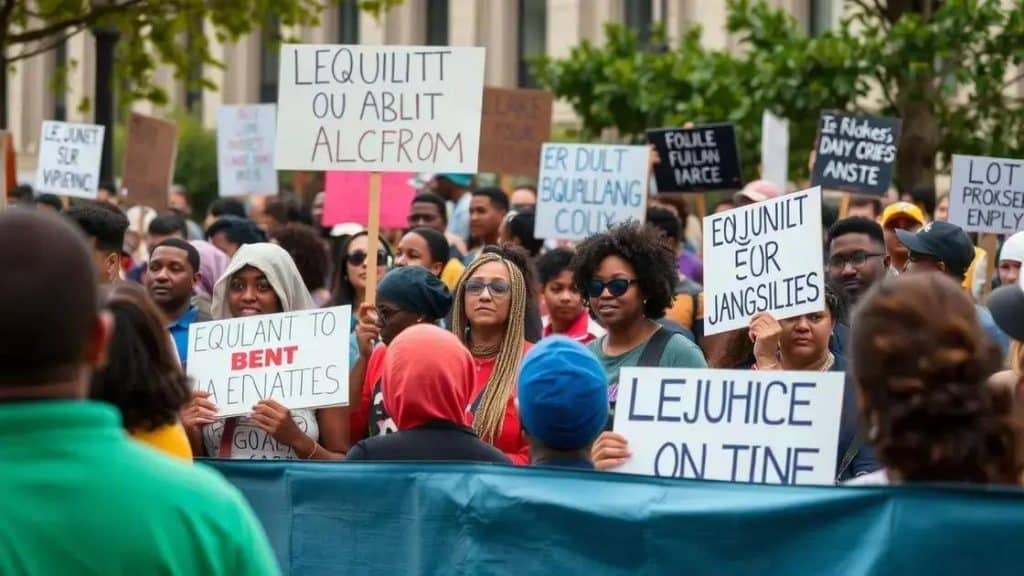Institution civil rights updates: what you need to know

Advocating for civil rights changes involves understanding key issues, mobilizing communities, participating in direct actions like rallies, and engaging with local representatives to influence policy and promote justice.
Institution civil rights updates play a vital role in shaping our society. Staying informed about these updates can empower individuals and communities to understand their rights better and advocate for change.
Understanding civil rights and their importance
Understanding civil rights is essential for everyone in a democratic society. These rights ensure that individuals have the freedom to live without discrimination and to participate fully in civic life. Knowing your civil rights can empower you to speak up and advocate for yourself and others.
What Are Civil Rights?
Civil rights refer to the rights of individuals to receive equal treatment under the law. They protect against discrimination based on characteristics such as race, gender, disability, and religion. Understanding these rights is crucial for fostering an inclusive community.
The Importance of Civil Rights
Why are civil rights so important? They serve as a foundation for fairness and justice, allowing individuals to seek legal remedies if their rights are violated. Here are some key points:
- Promote equality and protect against discrimination.
- Empower individuals to stand up for their rights.
- Encourage civic participation and community engagement.
Understanding your civil rights also helps build awareness about social issues and encourages active participation in advocacy efforts. When people know their rights, they can contribute to social change and hold officials accountable.
Education about civil rights is vital, especially in schools. Teaching students about their rights can nurture a sense of responsibility and community. It prepares future generations to advocate for themselves and others, ensuring that the principles of equality and justice continue to thrive.
In conclusion, awareness of civil rights is vital for upholding justice in society. Recognizing and understanding these rights can lead to a more equitable and just community.
Recent updates in civil rights legislation
Recent updates in civil rights legislation play a crucial role in shaping the landscape of equality and justice in society. These changes aim to protect individual rights and address ongoing issues of discrimination and inequality.
New Laws and Amendments
In recent years, several new laws have been enacted to strengthen civil rights protections. These laws focus on areas such as voting rights, workplace discrimination, and education equity. Understanding these updates is essential for everyone to ensure their rights are upheld.
- Strengthening protections against discrimination in hiring.
- Enhancing voting access for marginalized communities.
- Increasing accountability for law enforcement practices.
Additionally, amendments to existing legislation have clarified rights and expanded protections. For instance, the inclusion of additional categories of protection, such as gender identity and sexual orientation, marks significant progress towards equality.
Current Events Impacting Civil Rights
Various current events have also influenced civil rights legislation. Social movements advocating for equality and justice have raised awareness about systemic issues. As a result, lawmakers are increasingly responsive to public demands for change.
For example, advocacy groups continuously highlight the need for reforms in policing and criminal justice systems. These calls for action have spurred discussions in legislative chambers, leading to proposed bills aimed at promoting transparency and accountability.
Public involvement is vital in the legislative process. By staying informed and advocating for civil rights, individuals can help ensure that their voices are heard. Engaging in community discussions and contacting representatives can influence important changes.
Impact of civil rights updates on communities

The impact of civil rights updates on communities is profound and far-reaching. Changes in legislation can directly influence the lives of individuals by shaping opportunities and altering social dynamics.
Empowering Marginalized Groups
Updates in civil rights often empower marginalized groups, providing them with stronger protections against discrimination. This can lead to increased representation in various fields, such as political office, employment, and education. Efforts to promote inclusion become more robust as communities advocate for their rights.
- Increased access to education resources.
- Greater representation in local governments.
- Stronger support networks for affected individuals.
As communities become aware of their rights, they can organize and mobilize for change. For instance, grassroots movements often emerge in response to new updates that seek to address local issues. When people unite, they can effectively demand accountability and push for further advancements.
Creating Safer Environments
Updates to civil rights laws also contribute to creating safer community environments. For example, laws that address police accountability and discriminatory practices can help build trust between law enforcement and community members. Recognizing and acting on civil rights violations leads to safer interactions and improved relationships.
Furthermore, when individuals feel safe and respected, they are more likely to engage in civic activities. This involvement can range from voting to joining community organizations, all of which strengthen the social fabric.
Through educational initiatives, communities can learn how to navigate their rights and the resources available to them. Workshops and seminars focused on civil rights serve as vital tools for community empowerment and awareness.
Resources for staying informed on civil rights
Staying informed about civil rights requires access to reliable resources. Fortunately, many organizations and digital platforms provide valuable information and updates on civil rights issues.
Key Organizations
Several organizations focus on civil rights advocacy. They not only keep the public informed but also offer support for those who feel their rights have been violated. Some prominent resources include:
- The American Civil Liberties Union (ACLU)
- The NAACP (National Association for the Advancement of Colored People)
- The Human Rights Campaign (HRC)
- National Women’s Law Center (NWLC)
These entities frequently update their websites with the latest news, reports, and ways to get involved. Engaging with these organizations can help individuals understand their rights better.
Online Platforms and News Sources
In addition to organizations, various online platforms and news sources keep stakeholders informed on civil rights developments. Major news outlets often cover significant legislation and court cases impacting these rights. Following such sources is crucial for staying up-to-date.
- CNN and BBC for breaking news
- ProPublica for investigative journalism
- Local news outlets for community-specific updates
Social media also plays an essential role in disseminating information. Following relevant hashtags and accounts on platforms like Twitter and Facebook can provide real-time updates and promote discussions about civil rights.
Webinars and online workshops hosted by advocacy groups often dive deep into specific civil rights topics, making it easier to grasp complex issues and legal frameworks.
In summary, utilizing a mix of organizational resources, news outlets, and social media keeps individuals informed about current civil rights developments, enabling them to engage effectively in the advocacy landscape.
How to advocate for civil rights changes
Advocating for civil rights changes is crucial for promoting justice and equality in society. There are many effective ways individuals can make their voices heard and influence change.
Understanding the Issues
The first step in advocacy is understanding the specific civil rights issues that affect your community. Research the history and current state of these rights. By grasping the nuances of these issues, advocates can communicate effectively and convey their messages powerfully.
Engage with local organizations and attend community meetings. These resources provide insights into pressing concerns and the best strategies for advocacy.
Mobilizing Your Community
One effective way to advocate for change is to organize community events. Hosting discussions or workshops helps inform others about civil rights issues. When more people are aware, they are more likely to take action.
- Plan awareness campaigns to educate the public.
- Work with local leaders and activists.
- Use social media to reach a wider audience.
Building coalitions with other organizations strengthens advocacy efforts. These partnerships can amplify messages and create more impactful campaigns.
Direct Action and Participation
Taking part in demonstrations and rallies is another powerful way to advocate for civil rights. Public events draw attention to specific issues and demonstrate the community’s commitment to change. Ensure that these events remain peaceful and organized to convey a clear message.
Additionally, you can engage in direct lobbying. Contacting local representatives and expressing your views on civil rights issues can influence policy decisions. Writing letters, making phone calls, or setting up meetings are effective strategies for grassroots lobbying.
Finally, consider becoming involved in electoral processes. Supporting candidates who champion civil rights can lead to significant changes in legislation. Campaigning for these candidates can amplify their voices and ensure that civil rights remain a priority.
civil rights is essential for creating a fair and just society. By understanding the issues, mobilizing your community, and participating in advocacy efforts, you can help drive meaningful change. Stay informed and engage with local organizations to amplify your voice. Remember, every action counts, and together we can make a difference.
FAQ – Frequently Asked Questions about Civil Rights Advocacy
What are civil rights?
Civil rights are the rights of individuals to receive equal treatment under the law and to be free from discrimination.
How can I get involved in civil rights advocacy?
You can get involved by joining local organizations, attending community events, and participating in rallies that support civil rights.
Why is it important to stay informed about civil rights issues?
Staying informed helps you understand the challenges faced by marginalized communities and empowers you to advocate for change.
What actions can I take to advocate for change?
You can contact your local representatives, organize awareness campaigns, and participate in public demonstrations to advocate for civil rights.





